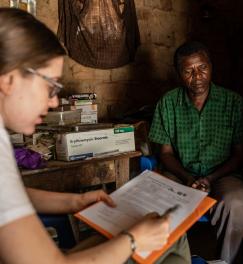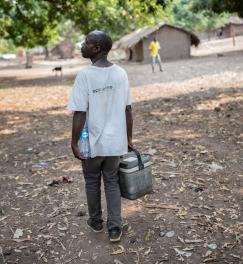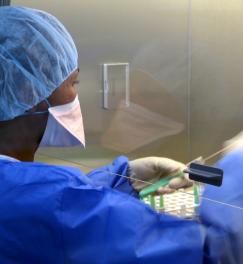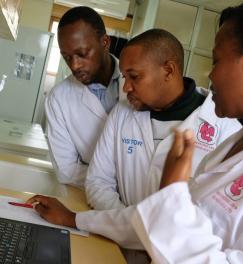Our partners
Thursday 14 February 2019 - Updated on Monday 3 March 2025
Collaborating allows us to strengthen our expertise but also to explore new medical and scientific fields, such as the late-stage development of vaccines or treatments relevant to MSF medical teams.
Partnerships facilitate the application of advances and their transfer to beneficiary populations. They can take many forms, ranging from informal consultations to networking and even the leadership of a multi-country, multi-partner consortium. This cross-fertilization and the resulting enrichment ensure that we can respond quickly to the needs of patients and populations in our areas of intervention.
Listed below are the organisations Epicentre has partnered.
Partnerships facilitate the application of advances and their transfer to beneficiary populations. They can take many forms, ranging from informal consultations to networking and even the leadership of a multi-country, multi-partner consortium. This cross-fertilization and the resulting enrichment ensure that we can respond quickly to the needs of patients and populations in our areas of intervention.
Listed below are the organisations Epicentre has partnered.
- ANRS
- AP-HP
- Bernhard-Nocht-Institut für Tropenmedizin
- Centre de Formation et de Recherche en Médecine Tropicale
- CEPI
- Chumakov Federal Scientific Center for Research & Development of Immune-and-Biological Products
- Comité National de Lutte contre le Pian, la Leishmaniose, la Lèpre et l'Ulcère de Buruli Cameroun
- Drugs for Neglected Diseases initiative (DNDi)
- Elsevier Foundation
- European and Developing Countries Clinical Trials Partnership Association EDCTP
- GARDPP
- Guttmacher Institute
- Harvard TS Chan School of Public Health
- HJF Medical Research International Ltd/Gte, Nigeria.
- Hôpital Régional Annexe d'Ayos, Cameroon
- IAVI
- Imperial College of Science Technology and Medicine, U.K.
- INRB, DRC
- Inserm
- Institut de Recherche en Sciences de la Santé, Burkina Faso
- Institut de Recherche pour le Développement
- Institut Pasteur Côte d’Ivoire
- Institut Pasteur du Cameroun
- Institut Pasteur de Dakar
- Institut Pasteur Paris
- IPAS
- Johns Hopkins Research Project, Malawi
- Kenya Medical Research Institute KEMRI
- Liverpool School of Tropical Medicine LSTM
- London School of Hygiene and Tropical Medicine LSHTM
- Mahidol Oxford Tropical Medicine Research Unit
- Makerere University, Uganga
- Massachusetts General Hospital
- Medic
- Mbarara University of Science and Technology, Uganda
- National Institute for Communicable Diseases, South Africa
- PATH
- PNECHOL-MD (Programme National d'Elimination du Choléra et de lutte contre les at
- Queen Elizabeth Hospital Laboratory Blantyre, Malawi
- Santé publique France
- St. George's Hospital Medical School
- Swiss Tropical and Public Health Institute
- Tulane University School of Public Health and Tropical Medicine, USA
- Uganda National Health Research Organisation
- Universidade Nova de Lisboa, Institute de Higiene e Medicina Tropical
- Université Abdou Moumouni de Niamey (UAM), Niger
- University of Cape Town, South Africa
- University of Florida, USA
- University of Liberia,
- University of Oxford, UK
- University of Sierra Leone
- University of Virginia, USA
- Université du Kinshasa, DRC
- UKAid
- Wellcome
- World Health Organization WHO
Mission
Find out more
Organisation and Funding
Find out more
Research Center Niger
Find out more
Research Center Uganda
Find out more






